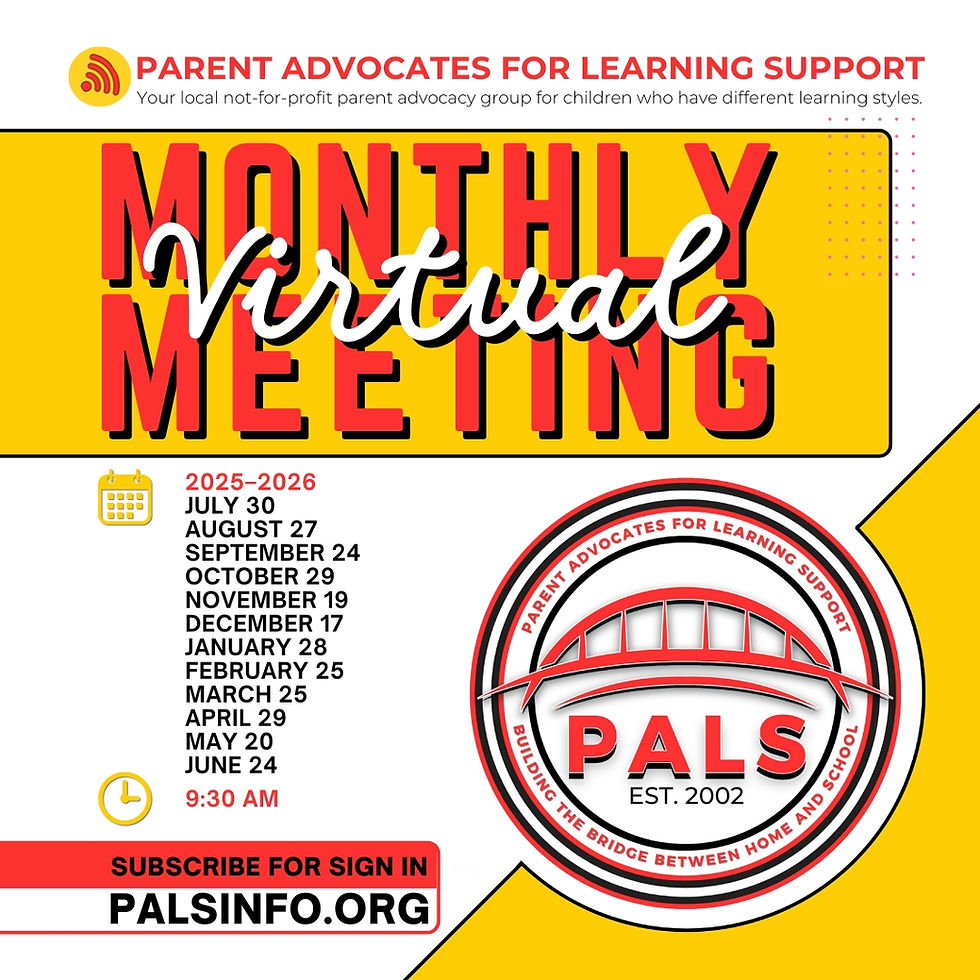June 25, 2025 Meeting Minutes - DHS Paperwork - ACT 62 - Inclusivity Training - Double Empathy Problem - Touch a Truck Event
- PALS
- Jun 24, 2025
- 8 min read
Updated: Jul 30, 2025
PALS Meeting Minutes
June 25, 2025 9:30 a.m.
Virtual Meeting using Zoom
Open Forum
Open Forum is an opportunity for participants to come together and discuss a variety of topics, offer resources, and ask questions related to special education.
Mistakes in DHS Paperwork Handling Creates Headaches for Families
Mistakes happen, none more concerning than those that impede your ability to access services for your child. Imagine you've received a diagnosis for your child, correctly completed the application process for Department of Human Services (DHS), and received approval. However, when you go to schedule services with providers you're told they are unable to do so because the birthdate they (the providers) have doesn't match that in the system and they are unable to move forward until it is corrected. Now what? You have multiple options depending on where the problem lies. Below, find a collection of resources to get you started. Know a resource we should include? Let us know!
Pennsylvania Department of Human Services (DHS) offer essential services and benefits catering to the diverse needs of Pennsylvanians and are dedicated to helping individuals and families thrive.
Allegheny County Department of Human Services (DHS)
Located at 1 Smithfield Street Pittsburgh, PA 15219 (Downtown)
Phone numbers: 800-581-9145 or 412-350-4636 (INFO) or 412-350-5701
Other Allegheny County DHS Contact Information
DHS Director's Action Line specialist are available Monday-Friday 8AM-5PM
Call 1-800-862-6783
Text "Action" to 412-324-3388
Send an Email
Allegheny County DHS Disability and Autism Support
Alliance for Infants and Toddlers
Locations: Main Office 2801 Custer Avenue Pittsburgh, Pennsylvania 15227 Call: (412) 885-6000
Beaver County SCU: 1070 8th Avenue, 2nd Floor Beaver Falls, PA 15010
Call: (724) 891-2827
Washington County SCU: 95 West Beau Street, Suite 300 Washington, PA 15301 Call: (724) 228-6832
Phone Number: 412-885-6000
Complete an intake form
Office of Developmental Supports
Locations: McKnight Road 4550 McKnight Rd., 1st Floor Pittsburgh, PA 15237 Phone: 412-436-2750 Fax: 412-271-1392
Executive Commons Building 110 Roessler Road, Suite 300D Green Tree, PA 15220 Phone: 412-253-1399 Fax: 412-253-1259
Phone Number: 412-253-1250
Send an email
Apply on your own for Supports Coordination services
"COMPASS is Pennsylvania's fast and easy way to apply online for health and human services. With the click of a button, you can learn about benefits, see if you may qualify, apply for benefits, and re-apply when it is time for renewal."
"If you've already submitted the application, you may need to report changes separately through your COMPASS account, by phone, mail, or in person, depending on the nature of the change."
In some cases you may find an "EDIT" button in the section where you need to make the change. If this is the case, make sure you click "SAVE" when completed.
In other cases you may need to submit a "CHANGE" along with documentation.
The COMPASS website also has a Chatbot feature name Ben to answer general questions and may point you in the right direction.
If you have a Service Coordinator, make contact with them for recommendations.
Call your local SSA Office. Yes, wait times are unfortunately long. Most offices list the national phone numbers; (P) 800-772-1213 (TTY) 800-325-0778. Look through your previous communications for another phone number or email address.
Find your local SSA Office at https://secure.ssa.gov/ICON/main.jsp
Make an appointment https://www.ssa.gov/manage-benefits/make-an-appointment.

Insurance Companies and Autism
We discussed the on going fight with private insurance companies as it relates to children with an Autism diagnosis and medically necessary services. With protections like Act 62 in place and the ability to enroll in CHIP or utilize PH95, families are still struggling to obtain services for their children when private insurance companies who do not acknowledge Autism do not deny services in writing, creating a slowdown in the medically necessary services. To figure out how families can combat this increasing problem we have reached out to a number of local advocacy groups for help. We hope to invite them to share their knowledge and resources in an upcoming meeting. If you have experienced a similar experience and would like to share how you overcame the situation, please consider joining the next meeting, or sending us an email.
UPDATE: After inquiring with a half-dozen agencies for recommendations the results were:
You might also want to provide the contact info for the PA Health Law Project—PHLP. They are very helpful. I'm pretty sure they only take calls on certain days, so they may want to check their website to be sure. www.phlp.org
I would reach out to the Pennsylvania health law project at staff@phlp.org or 1-800-274-3258. They can help!
I’ve included a link to a resource entitled Health Insurance Helplines. This is a list of organizations that can help you if you’re looking for health insurance, including Medicaid. These organizations can help you with the process and answer your questions. Some of the organizations can even help you apply. I hope this is helpful. https://paautism.org/resource/health-insurance-helplines/
While on the subject, take a brief look at Act 62, CHIP, and PH95.
Act 62
"In Pennsylvania, your child’s autism-related services may be covered by private health insurance, Medical Assistance (MA) or the Children’s Health Insurance Program (CHIP) under Pennsylvania’s Autism Insurance Act (ACT 62). ACT 62 is a statewide insurance mandate specific to services provided to children and adolescents with Autism Spectrum Disorder (ASD)." - Commonwealth of Pennsylvania
Additional Resources:
CHIP
"CHIP, short for the Children's Health Insurance Program, is Pennsylvania’s program to provide health insurance to uninsured children and teens who are not eligible for or enrolled in Medical Assistance. There are a lot of reasons kids might not have health insurance; maybe their parents lost a job, their parents are not offered health insurance at work, or maybe other options cost too much. Whatever the reason, CHIP may be able to help." - Commonwealth of Pennsylvania
Additional Resources:
PH95
"Medicaid for Children with Special Needs (PH95) provides full and free Medical Assistance (MA) coverage to children up to age 18 with disabilities whose parents make too much money to qualify for traditional Medicaid categories. The Children with Special Needs category is only authorized if a child is not eligible for any other MA category." - Commonwealth of Pennsylvania
Additional Resources:
Engaging Community Based Facilities to Educate Staff About Disabilities and the Double Empathy Problem
We discussed the difficulties people working in public facilities tend to face when working with people with disabilities and the question of whether or not they receive any level of training on working with a diverse public. We talked about the likelihood of such training based on the job and that many factors play into how much or how little diversity, equity, and inclusion training is provided by the employer. We found notations of trainings being provided to some county employees, however, specifics were sparse. We did find the latest copy of the Allegheny County Department of Human Resources Racial Equity Training and Support Directory, January 2025. It is important to note the following introduction provided within the document:
Allegheny County Department of Human Services (DHS) recognizes that racial inequities in access and opportunity, and across key indicators for success, are deep and pervasive for communities of color. DHS also recognizes that government — at the local, state, and federal level — has played a historical role in creating and maintaining racial inequity through a wide range of laws and policies. The resulting structures continue to drive outcome gaps between People of Color and white people across every indicator of success, from cradle to grave.
DHS also knows that other groups continue to face structural barriers to successful outcomes and continue to be marginalized including gender minorities, immigrants and refugees and those discriminated against based on sexual orientation, disability or other protected classes. As a result of these inequities, DHS established the Office of Equity and Inclusion in 2018. By leading with race and utilizing a racial equity framework, DHS works to ensure that there are targeted strategies to dismantle structural barriers impacting communities of color, as a means to improve outcomes for all marginalized communities.
There is strong interest among organizations in Allegheny County to advance racial equity, but they need support and may not know where to turn. To address this need, DHS created this Racial Equity Training and Support Directory, a publicly available and centralized list of qualified providers which offer services such as:
1. Training for staff, board members, and other stakeholders;
2. Enhance their organizational capacity to address disparate outcomes for people of color; and
3. Support the health and wellness of their staff through racial equity-focused self-care services.
Within this document, DHS offers a list of providers which offer training related to racial equity, diversity, and inclusion for organizaitons. Updated three times a year, this doucement offers "the providers’ mission/vision/philosophy, approach to intersecting identities, certifications or credentials related to racial equity, expertise working with specific populations or systems, and the racial makeup of their teams."
The DHS is letting every organziation in the community know that training is available and it is up to the organziation to understnad the importance of such training on every level. Pivoting back to the original point of the conversation, we discuss The Double Empathy Problem.
The term Double Empathy Problem was first used in 2012 by Damian Milton. The theory "suggests communication difficulties between autistic and non-autistic individuals are not solely due to a lack of empathy in autistic people. Instead, it proposes that both groups may struggle to understand each other's perspectives due to differences in how they experience and process the world. This "double" problem arises because each group has different social expectations and communication styles." - Olivia Guy-Evans, MSc in the article Autism & Double Empathy Problem in Simply Psychology

Milton first published the double empathy problem theory with "a combination of personal experience, anecdotal accounts, and limited qualitative data." - The 'double empathy problem": Ten years on. Now, thirteen years later, numerous studies in multiple fields have been conducted on Double Empathy Problem.
While thinking about the Double Empathy Problem and training provided to employees, the natural thought process comes down to educating people as early as possible; for instance, in school. A meta-analysis and literature review conducted in Australia found;
"five benefits of inclusion for non-disabled students: reduced fear of human difference, accompanied by increased comfort and awareness (less fear of people who look or behave differently); growth in social cognition (increased tolerance of others, more effective communication with all peers); improvements in self-concept (increased self-esteem, perceived status, and sense of belonging); development of personal moral and ethical principles (less prejudice, higher responsiveness to the needs of others); and warm and caring friendships.”
Additional Resources:
Touch a Truck Event
PALS participated in the 3rd Annual Touch a Truck Event on June 7, 2025 at Tour Ed Mine in Tarentum hosted by Powered By Love. This amazing organization is a parent lead autism support group in Butler County. Heather and Kim organize this annual event on their own and do a fantastic job getting a multitude of large trucks, vendors, food trucks, activities, a bonus house, petting zoo, and pony rides together. PALS was happy to be included in this fantastic event.

Summer Survival Kit for FCASD Families

Meeting Topic Survey
Take our suvery and help shape upcoming PALS meetings by sharing what topics you would like to learn more about. *Your email and/or Google account information ARE NOT collected in the process of completing this survey.
Next Meeting: July 30, 2025 9:30 a.m. Virtual Meeting using Zoom.
Log in for all meetings included in every newsletters. Become a subscriber in the footer.











Comments